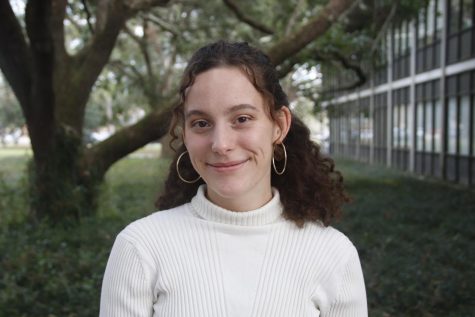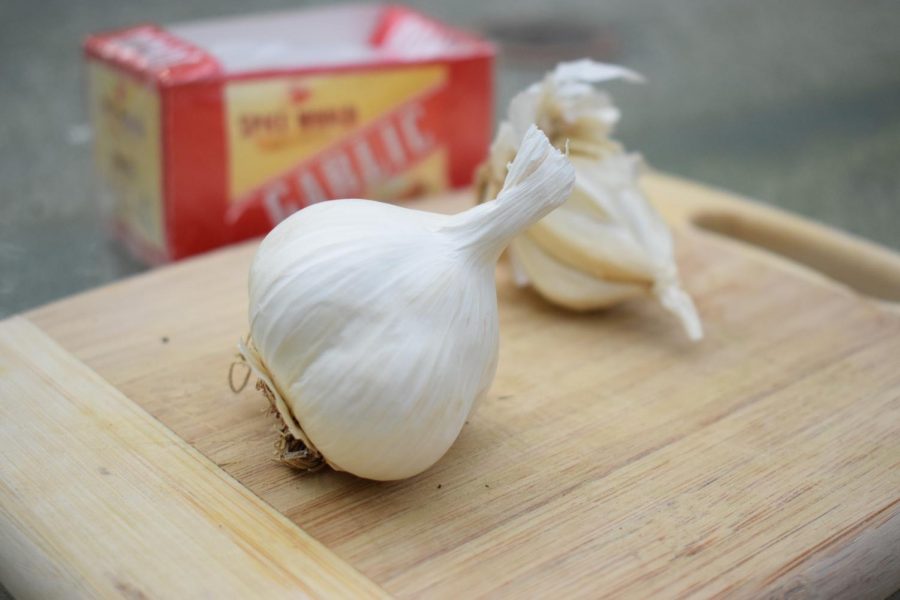Coronavirus: Myths vs. Facts
Elana Guillory/The Lion’s Roar
Home remedies that include ingredients such as garlic are rumored to treat COVID-19. While home remedies might alleviate symptoms of the coronavirus, there is no definite cure as of March 2020.
False information for the COVID-19 virus has been circulating social media platforms since the beginning of the pandemic.
Heat, essential oils, garlic, chlorine dioxide and other fake vaccines have been rumored to treat the virus. More concerning and harmful false treatments like drinking bleach and snorting cocaine have also circulated the internet.
While traditional home remedies may alleviate some symptoms when a person is infected, there is currently no proven cure or vaccine for COVID-19.
Scientists have yet to solidify a COVID-19 vaccine for the masses. Volunteers in a recent experiment received their first doses of a vaccine that could show promising results.
Moderna Inc., a biotechnological company in Massachusetts, recently developed a potential COVID-19 vaccine, mRNA-1273. It has shown promising results when tested on animals, and the first of 45 healthy participants in the vaccine’s experimental trials already received their first dose.
The vaccine developed rapidly and will have to undergo three trials before it can be released to the public. In these trials, scientists have to prove that it is not only effective, but that it is also safe before it is released to healthcare facilities.
A barrier that stands in the way of the release of mRNA-1273 is after vaccination passes phase three, mass production of the vaccine may be difficult, since organizations may not have an adequate number of resources. Experts estimate at least a year before everyone has access to the vaccine.
In the meantime, the National Institutes of Health and Food and Drug Administration have been experimenting with antiviral drugs that, according to FDA.gov, may “be helpful in reducing lung inflammation and improving lung function in COVID-19 patients,” which will reduce severity of symptoms.
Other therapies are being evaluated on whether they can lower the severity or length of the virus.
As far as home remedies go, the World Health Organization recommends that people with mild symptoms get rest, stay warm, stay hydrated and use steam to soothe a sore throat.
In addition, the only proven prevention measures include the standard practices of good hygiene. According to the Centers for Disease Control and Prevention, “Avoid close contact with people who are sick, stay home when you are sick, except to get medical care, cover your coughs and sneezes with a tissue,” and “clean frequently touched surfaces and objects daily.”
Medical professionals are experimenting with treatments for COVID-19, and the FDA has reminded the public that companies may try to make claims about products “that are not approved – and don’t have data supporting efficacy – in preventing treating or diagnosing COVID-19.”
When searching for accurate information, a person should always make sure they are researching using a reliable source.
In an article called, “Be careful where you get your news about coronavirus” published in Harvard Health Publishing, faculty editor Robert Shmerling listed ways people can ensure their information is reliable.
“Rely on experts who use well-accepted scientific analyses and publish their results in reputable medical journals, have a mission to inform and protect the public, such as the CDC and the WHO, which recently added a myth busters page to its information on the virus, (and) are not promoting or selling a product related to the information provided,” said Shmerling.
Your donation will support The Lion's Roar student journalists at Southeastern Louisiana University.
In addition, your contribution will allow us to cover our annual website hosting costs.
No gift is too small.

Elana Guillory is an art major and lives in Ponchatoula. She worked as a reporter for The Lion's Roar from the fall of 2019 until April 2021, and now she...







